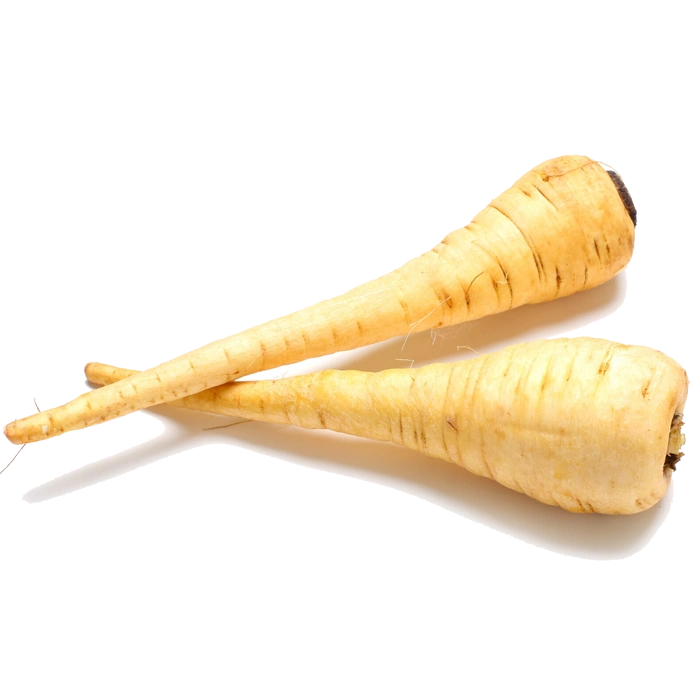
Nutritional properties of Horseradish
Energy :
None Kcal / 100g
Category : Spices & Sauces
Group : Basic Spices & Condiments
Composition And Nutritional Value :Horseradish (Armoracia rusticana) is a root vegetable that is known for its strong, pungent flavor and is commonly used as a condiment. It contains a variety of beneficial compounds, including glucosinolates, which are sulfur-containing compounds that give horseradish its characteristic spicy taste and have potential health benefits. Horseradish is low in calories but provides small amounts of vitamins such as vitamin C, B-vitamins (especially folate), and minerals like calcium, potassium, and magnesium. It also contains fiber, which aids in digestion, and is a good source of antioxidants, which help reduce oxidative stress in the body.
Health Benefits :
Digestive Health: Horseradish has been traditionally used to stimulate the appetite and promote digestion. It can help increase the production of digestive enzymes and bile, aiding in the breakdown of food. It is also known to relieve bloating and indigestion.
Antibacterial and Antiviral: The glucosinolates in horseradish have been found to exhibit antibacterial and antiviral properties. This makes horseradish a good choice for fighting off infections, particularly in the respiratory system.
Respiratory Health: Horseradish is commonly used as a natural remedy for sinus congestion, colds, and coughs. The spicy compounds in horseradish can help clear mucus from the sinuses and lungs, providing relief from respiratory issues.
Detoxification: The sulfur compounds in horseradish are believed to aid in the body's detoxification process by stimulating the liver and promoting the excretion of toxins.
Anti-inflammatory: Some studies suggest that horseradish may have anti-inflammatory effects, which could be beneficial for people suffering from conditions like arthritis, muscle pain, or other inflammatory disorders.
Culinary Uses :
Horseradish is typically used in its grated or prepared form as a condiment, where it adds a sharp, spicy heat to dishes. It is commonly served alongside meats, particularly roast beef, in sandwiches, or in sauces and dressings. Horseradish sauce, which is made by combining horseradish with vinegar, cream, or mayonnaise, is popular in various cuisines, especially as a topping for steaks, sandwiches, and cold cuts. In addition to its use as a condiment, horseradish is sometimes added to salads, dips, and soups to give them an extra punch of flavor.
Types :
Fresh Horseradish Root: This is the unprocessed root, which is typically peeled, grated, or chopped to release its spicy flavor. It is the most potent form of horseradish and can be prepared into homemade horseradish sauce.
Prepared Horseradish: This is the commercially prepared form of horseradish, often mixed with vinegar, salt, and sometimes sugar to preserve it. It is ready to use as a condiment and has a milder flavor compared to fresh horseradish.
Horseradish Powder: This is a dried and powdered form of horseradish root, which is used in spice blends or as an ingredient in sauces. It is convenient but typically has a less intense flavor than fresh horseradish.
Shopping And Storage Tips :
Selecting Horseradish: When purchasing fresh horseradish root, look for firm, smooth roots without blemishes or soft spots. The fresher the root, the stronger the flavor. Prepared horseradish should be stored in airtight jars, and the label should indicate the presence of preservatives to ensure long shelf life.
Storage: Fresh horseradish root should be stored in the refrigerator, wrapped in plastic or placed in a plastic bag. It can last for several weeks this way. Prepared horseradish should be stored in the refrigerator and used within a few months of opening for the best flavor. Horseradish powder should be kept in an airtight container in a cool, dry place.
Preserving Freshness: Fresh horseradish loses its flavor and pungency quickly after being grated, so it's best to prepare it just before use. To preserve it for longer periods, you can pickle the grated horseradish or store it in vinegar, which will help maintain its sharpness and flavor.

